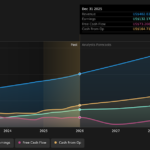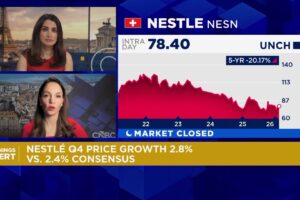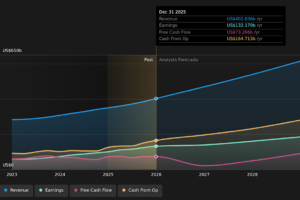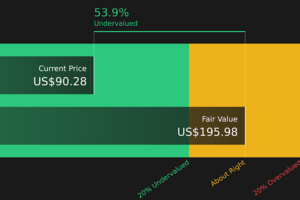
Bloomberg
Maskless Xi, China’s Modest GDP Target, Hong Kong: NPC Update
(Bloomberg) — China’s most senior officials gathered in Beijing to kick off the annual full-session of the country’s parliament, the National People’s Congress.Chinese Premier Li Keqiang unveiled a conservative target for economic growth this year of above 6% that signals more restrained monetary and fiscal policies this year, in contrast to other major nations still pumping in stimulus. But China’s new five-year plan that runs through 2025 didn’t give a numeric target for average growth.What to Know:Click here to read more on this year’s NPCEverything you need to knowFull NPC reports. Highlights hereA QuickTake explainer on the NPCWhat analysts say to watch out for this yearBloomberg Intelligence previews the NPC. Reaction to GDP goalHow China plans to be greener by 2025Clips of other reactions here and here. Key takeaways hereLatest developments: (Time-stamps are local time in Beijing)Upcoming Events: Foreign Minister, 5-Year Plan BriefingKey upcoming NPC events that have been announced so far include:March 7, afternoon — Foreign Minister Wang Yi speaks to mediaMarch 8, 10 a.m. — NDRC Vice Chairman Ning Jizhe discusses 14th five-year plan at briefingMarch 8, 3 p.m. — NPC plenary session, with delegates listening to work reports delivered by NPC standing committee chairman, head of of the supreme court and the top procuratorMarch 11, 3 p.m. — NPC closing session. Delegates will vote on work reports, 14th Five-Year Plan, and other legislative revisions including decision on revising Hong Kong’s electoral systemMaskless Xi (2:22 p.m.)Despite being one of the first countries in the world to authorize vaccines for use, China has said nothing about the vaccination status of its top leaders, who all — including President Xi Jinping — appeared without face masks in Beijing Friday, mingling with thousands of delegates from across China at the country’s biggest political gathering of the year.While officials seated in the rows behind them were all masked, Xi and Chinese Premier Li Keqiang moved around the Great Hall of the People, where the National People’s Congress is opened every year, mask-free. The exception seemed to apply only to members of the Politburo and a handful of other top Communist Party leaders. Xi also went without a mask at last year’s NPC, seen as a statement on China’s virus success with the Wuhan outbreak largely quelled.Export to Rise More Than 50% (2:20 p.m.)China’s exports may have risen more than 50% in January to February, He Lifeng, head of the nation’s economic planning agency, said in a group interview. Power consumption and generation increased by more than 20%, the economy kept improving in the first two months, though the external environment poses challenges to the Chinese economy, he said.Family Offices Overhaul (12:30 p.m.)Xiao Gang, former chairman of China’s securities regulator, proposed revising the nation’s family trust law, saying impediments such as high taxes have forced many family trusts to hoard cash rather than make investments, according to the China Securities Journal.Assets controlled by China’s wealthiest people are expected to double from 2019 to 116 trillion yuan ($18 trillion) by 2025, according to UBS Global Research. But according to a Credit Suisse Group AG report in October, wealth inequality has also risen rapidly, estimating that the country had 5.8 million millionaires and 21,100 residents had wealth of above $50 million — more than any country except the U.S. — at the end of 2019.Steelmakers Optimistic (12:27 p.m.)Chinese steelmakers are optimistic for this year as the nation’s efforts to decarbonize and consolidate the industry continue, the China Economic Times reported, citing steel mill executives at the National People’s Congress. Demand will improve this year, benefiting from high growth targets set by local governments at the start of the 14th five-year plan, according to Xia Wenyong, chairman of Xinyu Iron & Steel Group. Steel production may drop marginally after the country’s pledge to cut output from a record high last year, said Li Lijian, chairman of Anyang Iron & Steel Group.Feeding 1.4 Billion Mouths (12:25 p.m.)China rolled out a roadmap to boost crop production in the world’s most populous nation, highlighting concerns over food security after the country imported record amounts of meat, corn and soybeans last year. Measures include creating agricultural belts devoted to large-scale farming and providing sufficient subsidies to motivate grain farmers, according to the latest five-year plan that sets out key economic and political goals through 2025.Food security is moving to the top of the government’s agenda after the coronavirus pandemic and outbreaks of African swine fever raised concerns over whether China could guarantee food supplies for its 1.4 billion people. Imports of meat and grains surged last year, driving global prices higher and stoking worries over food inflation.Fresh Blow to Tech Giants (12:27 p.m.)China called on its technology giants to share key data, dealing a further blow to the companies already reeling from heightened antitrust scrutiny.Companies are encouraged to open up data related to areas from search to e-commerce and social media, in order to promote the healthy development of the sharing and online economies, according to a government report outlining the Communist Party’s top priorities for the next five years. Beijing is also establishing a platform for sharing public and government data.China also pledged to boost spending and drive research into cutting-edge chips and artificial intelligence in its latest five-year targets, laying out a technological blueprint to vie for global influence with the U.S.Biosecurity (11:45 a.m.)China plans to ramp up the construction and management of biosecurity labs to prepare for future emerging diseases, while it also grapples with allegations from the U.S. that the coronavirus outbreak could have resulted from a lab leak.The country seeks to “comprehensively enhance biosecurity governance capabilities” by improving its monitoring and emergence preparedness, according to a document outlining major policy priorities through 2025. The report was released Friday as lawmakers from the world’s second-largest economy meet in Beijing for the annual parliamentary session.More Oversight of Ant? (11:30 a.m.)China plans to step up oversight of financial holding companies and the nation’s booming fintech industry, Premier Li Keqiang said, setting the tone for closer scrutiny over the next five years of behemoths including Jack Ma’s Ant Group Co.The authorities will also expand an anti-monopoly crackdown and prevent the “unregulated” expansion of capital to create fair competition, Li said Friday at the opening of the National People’s Congress. The fintech sector should be developed in a “prudent” manner and China aims to create a “deviation correction” mechanism to fix and suspend innovative financial products when needed, according to a separate plan covering policies for 2021 to 2025.China’s policymakers are walking a fine line of trying to curb risks at home while encouraging local champions as the economy opens wider to foreign capital. Fintech has become the latest target of scrutiny since the nation’s leaders pledged in 2017 to clean up threats to its $53 trillion financial industry, tackling property loans, opaque wealth management products and fraud-riddled peer-to-peer lending.Overhauling H.K. Electoral System (11:16 a.m.)China is curbing the ability of democracy activists to win elections in Hong Kong, with local reports saying a vote for the territory’s legislature would be delayed another year to September 2022.The National People’s Congress will review a draft resolution on changes to Hong Kong’s electoral system in the coming days, according to an agenda published Thursday by the official Xinhua News Agency. For weeks Chinese President Xi Jinping and other officials have called for “patriots” to run Hong Kong, effectively signaling that anybody deemed disloyal to Beijing couldn’t hold a leadership position.Separately, Hong Kong Chief Executive Carrie Lam said the city will amend local election legislation after China’s top legislative body passes new election rules for the city’s leader and lawmakers. The amendments will be tabled at the legislature for vetting, the principle of “patriots ruling Hong Kong” is fully in line with constitutional requirements of the city and “One Country, Two Systems” will be placed in jeopardy if forces that oppose China and stir up trouble in Hong Kong enter the political system via elections, she said.Tackling Housing (11:02 a.m.)China pledged to solve the housing problem in large cities at its top legislative session, as monetary loosening after the pandemic spurred a rush to real estate in the biggest hubs, pushing home affordability there to the worst ever.“We will address prominent housing issues in large cities,” Premier Li Keqiang said. Li echoed President Xi Jinping’s mantra that houses are “for living in, not for speculation” in the key report, signaling that policy makers may maintain a tight rein on the bubble-prone sector. “We will keep the prices of land and housing as well as market expectations stable,” he said.Boosting Usage of Non-Fossil Fuels (10:52 a.m.)In its 14th 5-year plan released Friday, China said it plans non-fossil fuels to account for 20% of energy use by 2025, versus 15% at the end of 2019. The country is also targeting it nuclear power capacity to increase about 40% to 70 gigawatts by 2025.China will also boost oil-and-gas exploration, expand its gas pipeline network, improve coal transportation and increase its ability to ensure supply.More Charging Stations for Electric Cars (10:40 a.m.)China aims to boost auto sales and add more charging facilities for electric vehicles this year. The government will encourage “steady increases” in spending on cars and “abolish excessive restrictions” on the sale of used vehicles, Premier Li Keqiang said Friday. More car parks, EV charging stations and battery-swapping facilities will be built, and battery recycling systems developed at a faster pace, Li said.Premier Calls for Breakthroughs in Core Tech (10:29 a.m.)In his address Friday, Premier Li Keqiang outlined steps the government will take to make China into a global tech power. That includes building more national laboratories and innovation centers, as well as ramping up efforts to implement a little-heard of program called the Sci-Tech Innovation 2030 Agenda. Li also said China’s R&D spending will increase by more than 7% per year, which “is expected to account for a higher percentage of GDP” than during the previous five-year plan.Defense Budget Growth Fastest in Two Years (10:20 a.m.)China’s defense spending is expected to grow 6.8% this year to 1.35 trillion yuan ($208 billion), according a budget report released today. That would be the fastest pace in two years. “We will boost military training and preparedness across the board, make overall plans for responding to security risks in all areas and for all situations,” Premier Li Keqiang said in his work report.Boosting Trade with U.S. Allies (10:05 a.m.)China may join an Asia-Pacific trade pact comprised of key U.S. allies that former President Donald Trump exited, Premier Li Keqiang said Friday. In his work report, Li said Beijing “will actively consider joining” the 11-nation agreement known as the Comprehensive and Progressive Agreement for Trans-Pacific Partnership. It includes nations that China has sparred with recently such as Australia, Canada and Japan.China Stocks Fall 10% From Recent Peak (9:59 a.m.)Chinese markets opened as Premier Li Keqiang was delivering his work report at the NPC and continued their recent slide, with the benchmark CSI 300 Index dropping as much as 2% at the start of trading. That put the index down 10% from a peak reached on Feb. 10. The rout has come amid growing concern that Beijing will begin to tighten liquidity conditions as the country’s economy recovers from the effects of the coronavirus.Cuts in Carbon Emissions (09:43 a.m.)China will devise a plan for carbon emissions to peak by 2030 and is targeting an 18% cut per unit of GDP by 2025, according to Premier Li’s work report. The nation will also aim for a 3% reduction in energy consumption per unit of GDP in 2021 and a 13.5% reduction by 2025.Tencent’s Pony Ma Makes Proposals (09:16 a.m.)Tencent founder and Chief Executive Pony Ma, who is an NPC delegate, is attending this year’s event in Beijing and submitted a proposal for better preserving China’s natural resources. Ma’s whereabouts have attracted attention after he skipped last year’s NPC and was also absent from several major Tencent events due to health reasons.China Sets Modest GDP Target for 2021 (09:00 a.m.)China set a conservative economic growth target of above 6% for the year, well below what economists forecast, and outlined ongoing fiscal support to keep the country’s recovery going. Other key economic targets include:Fiscal deficit target set at 3.2% of GDP for 2021, versus 3.6% in 2020CPI target set at 3% for 2021, versus around 3.5% in 2020Target for new urban job creation set at 11 million in 2021, versus 9 million in 2020Special government bond quota set at 3.65 trillion yuan in 2021, versus 3.75 trillion yuan in 2020For more articles like this, please visit us at bloomberg.comSubscribe now to stay ahead with the most trusted business news source.©2021 Bloomberg L.P.








